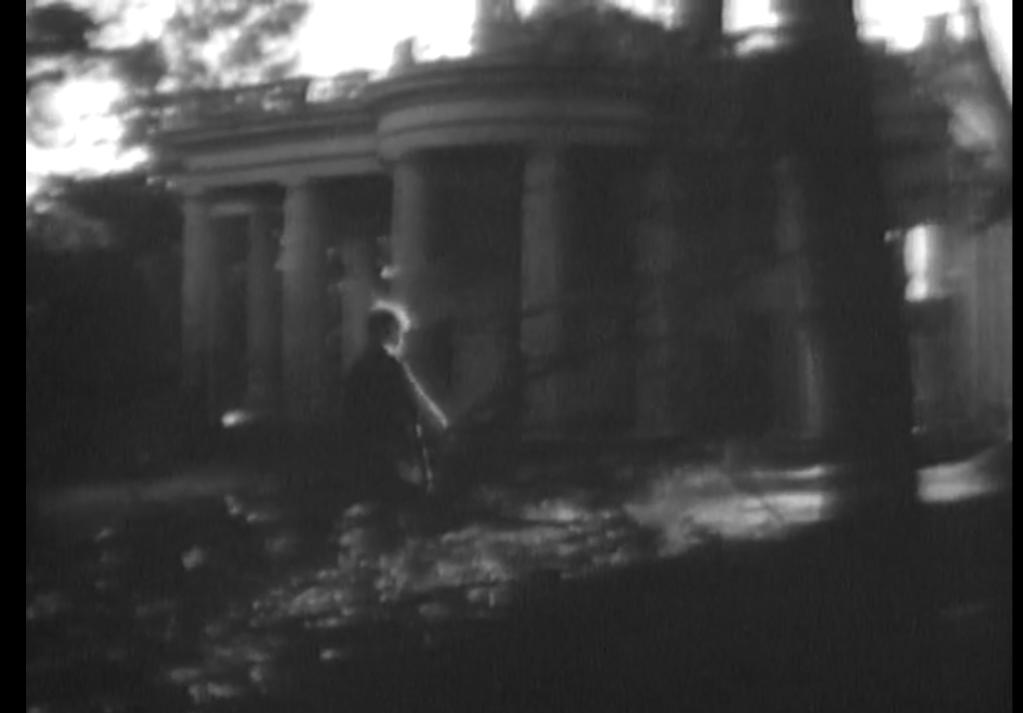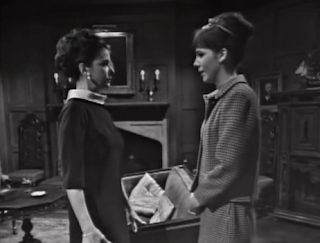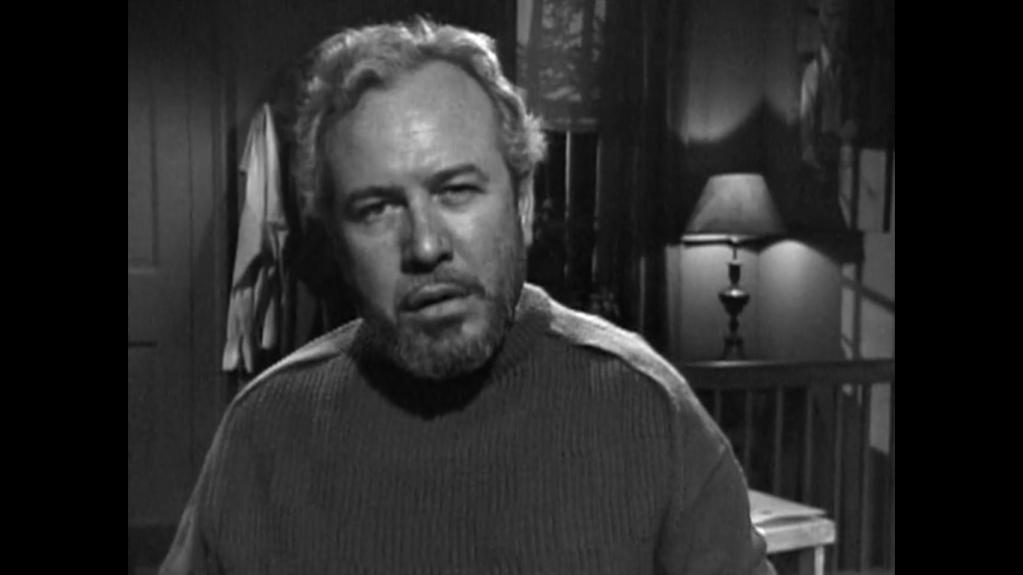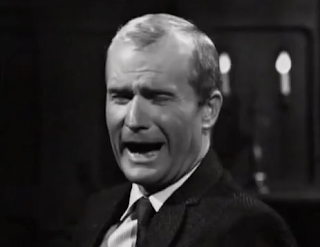The writers didn’t always put a lot of effort into Dark Shadows’ opening voiceovers, but today’s is exceptionally dire:
My name is Victoria Winters.
Collinwood is still living up to its name as a ghost-ridden house where deaths have gone unsolved. Except that in this case, the murderer is known. Only his whereabouts are unknown. But much like a wounded animal at bay, he has taken refuge in the one place where he thinks he will be safe. The Old House has already been searched thoroughly, so Matthew Morgan feels this is one place the police will not look again.
“Collinwood is still living up to its name”- it is still in the woods and is still occupied by people called Collins? No, “its name as a ghost-ridden house.” So, it is living up to its reputation, not to its name.
Then we get three short sentences beginning with “Except,” “But,” and “Only.” If the narrator has to issue three retractions in fifteen words, it’s difficult to be optimistic about what will happen when people start exchanging dialogue.
“But much like a wounded animal at bay, he has taken refuge in the one place where he thinks he will be safe.” How does that make him more like a wounded animal at bay than like any other creature who is aware of only “one place where he thinks he will be safe”?
“The Old House has already been searched thoroughly”- that sounds OK, until about 30 seconds into the episode, when Matthew lets himself into a secret chamber of the Old House that only he knows about. When you say a house has been searched “thoroughly,” I for one assume you mean that the searchers figured out how many rooms were in it.
This is the final script credited to Francis Swann. That sloppy, confused narration doesn’t sound like his writing. Maybe he was in such a rush to be done with Dark Shadows that he didn’t bother to take a second look at the opening voiceover once he’d pounded it out of his typewriter.
Or maybe he didn’t write it at all. Malcolm Marmorstein’s name will appear in the credits soon, and Marmorstein was eminently capable of writing something that lousy. The actors have an unusually hard time with their lines today, as if the teleplay got to them later than usual. Swann hasn’t written an episode since #106, and that one felt very much like his farewell. So it could be that Marmorstein was supposed to write this one, got stuck, and Swann came in to bail him out.
Further supporting that theory is a change of texture between the first half of the episode and the second half. After the prologue showing the fugitive Matthew hiding in the Old House, we go to the room in the Collinsport Inn occupied by dashing action hero Burke Devlin. Mrs Johnson, housekeeper at Collinwood and spy for Burke, visits him there. She recaps the last couple of episodes for him. The scene is listless and disjointed, in part because of the actors going up- at one point Clarice Blackburn actually prompts Mitch Ryan with Burke’s next line- but also because they have so little to work with when they do remember what they’re supposed to say.
After Mrs Johnson leaves Burke’s room, strange and troubled boy David Collins drops in on him. Mitch Ryan and David Henesy were always fun to watch together, and they manage to get a good deal of interest out of an opening exchange in which David tries to get Burke to admit that Mrs Johnson is his agent inside the Collins home. They then go into Burke’s kitchen, where they talk about their respective grudges against David’s father, high-born ne’er do-well Roger Collins. That’s an emotionally charged topic, and the kitchen is an intimate space. But the conversation is dull. The actors don’t look at each other very much- even when they aren’t reading off the teleprompter, they keep casting their eyes to the floor, as if they’re having trouble staying awake. You can’t blame them if they are sleepy- there’s nothing new in their lines.
The second half of the episode takes us back to Collinwood, and all of a sudden it comes to life. In the foyer, an authoritative-sounding Mrs Johnson scolds David for not hanging his coat up properly. He then puts her on the spot with his ideas about her and Burke. Once he has her good and nervous, he tells her he’s going to the Old House to talk to the ghosts. Mrs Johnson takes the supernatural very seriously, and responds to that idea with some words spoken in a deeply hushed tone. She finally dismisses him with a brusque command to be back for dinner. After the door closes behind him, she looks about for a moment, pensive. Taking Mrs Johnson through these moods, Clarice Blackburn traces a clear line of emotional development that gives the scene a healthy dose of dramatic interest.
We are then treated to a previously unseen location insert in which David is skipping along the path to the Old House. It’s a lovely little scene, dreamlike and eerie:

David stands before the portrait of Josette Collins and asks for information about Matthew. The portrait isn’t talking, but Matthew himself appears. David tells Matthew that he doesn’t believe he is a murderer, and that the two of them can investigate and prove his innocence. When David tells Matthew he has no choice but to trust him, Matthew asks “Ain’t I?” Returning viewers remember that in the previous two episodes, well-meaning governess Vicki and reclusive matriarch Liz both asked Matthew to trust them. In response, he tried to kill Vicki, and only his fanatical devotion to Liz kept him from doing the same to her. David’s blithe self-assurance stops Matthew this time, and he agrees to stay in the Old House and let David take care of him.
This episode is the first time we see the secret chamber off the parlor of the Old House. Much will happen there. Another first comes when Matthew is deciding whether to trust David or to kill him. He goes to the window of the parlor. We cut to the outside, and see him in the window thinking murderous thoughts. Many, many times next year and the year after we will see another character, one not yet introduced, in that window, vowing to kill someone or other.
The Old House isn’t the only place where today brings firsts. Up to this point the proper way for people to dispose of their coats when entering the great house of Collinwood has been to fold them and place them on a polished table in the foyer. But this time, David responds to Mrs Johnson’s reproof by taking his coat to a space next to the door where he mimes placing it on a hanger. In later years, we will actually see a set dressing there that can pass for a closet, but for now we just have to imagine one exists.



